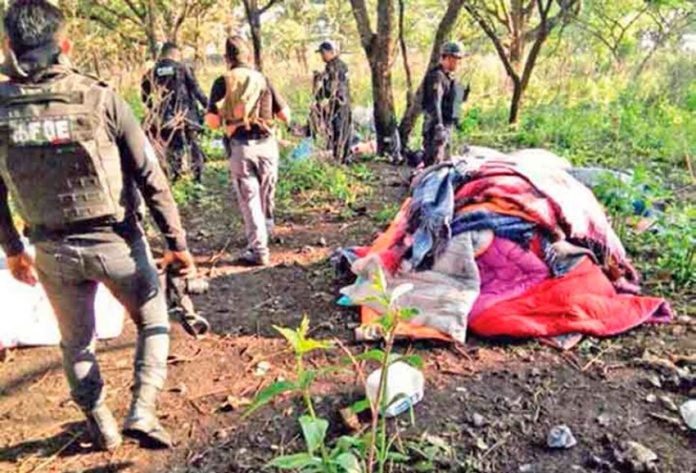“Today, we’re going to do some tests to see how much you’ve learned,” the boss told the group of 19 recruits. “Stay calm, please. I don’t want to kill anyone.”
It was noon on a summer day in Talpa de Allende, Jalisco, and the heat was unbearable. The “test” consisted of standing completely still for an hour, wearing two heavy jackets, holding an AK-47 in shooting position.
Fire ants soon started climbing up the recruits’ legs.
One of them, Francisco, later told Spanish-language broadcaster Telemundo about his experience in a Jalisco New Generation Cartel (CJNG) training camp.
“The ants started to bite us, it was horrible,” he said. “My foot started to fall asleep from the ant bites, but I couldn’t put the rifle down . . . You know that if you mess up, they’ll kill you.”
The purpose of the exercise, the recruits were told, was to teach them to separate pain in their minds, a skill that could save their lives if they were ever injured in a battle.
Francisco, 34, remembers how it all started, in April 2018. He was in a bar in a state in southern Mexico when a stranger approached him, asking for a ride to an ATM. Francisco obliged, and when the stranger got out of the car he asked for Francisco’s number, saying, “I like you, I’m going to give you a call.”
Francisco later found out that the stranger was a son of Nemesio “El Mencho” Oseguera, the leader of the CJNG. After the arrest of Joaquín “El Chapo” Guzmán in 2016, El Mencho became the most wanted person in Mexico, and the U.S. Justice Department offered a $10-million reward for his capture.
Soon after their meeting in the bar, the stranger called Francisco and offered him a job as a private security guard in Jalisco. The pay, 3,500 pesos (US $184) a week, was good, and the job included four weeks of paid training. It wasn’t until Francisco and the 18 other recruits were about to arrive at a training camp in Jalisco that they learned they would be working for the CJNG.
Francisco says they were trained by former military servicemen from Mexico and the United States, who enforced military discipline. The U.S. Defense Department said it does not have information about the activities of former servicemen, while an anonymous police source confirmed to Telemundo that both retired and active-duty Mexican servicemen are involved with the CJNG.
When he was at the training camp in Talpa de Allende, Francisco and the other recruits had to collect wood and build fires in a meter-deep pit where the cartel disposed of the bodies of victims.
“Some of them were still alive when we put them in there,” he said. “It took a whole day for them to burn, and then we had to spread the ashes around.”
The bodies that Francisco helped burn are some of the more than 7,000 missing people in the state of Jalisco.
Francisco fondly remembers his graduation from the training camp, when the cartel held a party for the graduates, with norteño bands, women and expensive whisky. At that point, Francisco still hadn’t killed anyone.
After his graduation, Francisco became a soldier for the CJNG, where his responsibilities included packing individual doses of methamphetamine. Later, he had to kill, but he wouldn’t say how many people he has killed.
Eventually, the cartel gave Francisco permission to “put his sneakers on” — to retire. But since he broke off contact with his former employer, Francisco has lived in hiding, afraid that CJNG members who don’t know he was allowed to leave might see him as a traitor or deserter.
It’s been a year since Francisco’s journey began. He hopes that by talking publicly about his experiences he’ll be able to help find some of the thousands of disappeared people in Jalisco and bring closure to their families.
